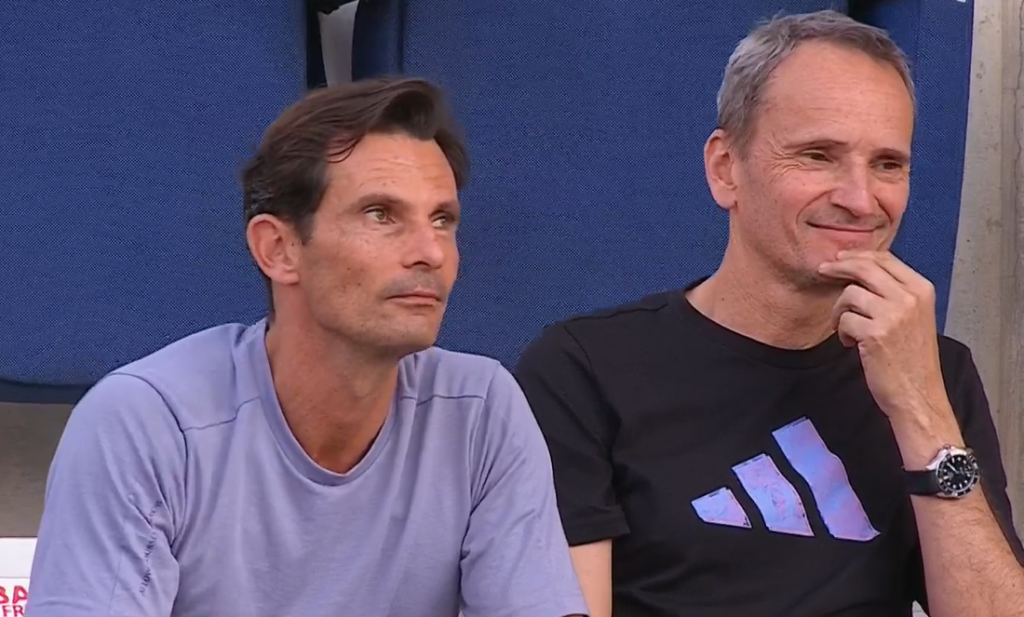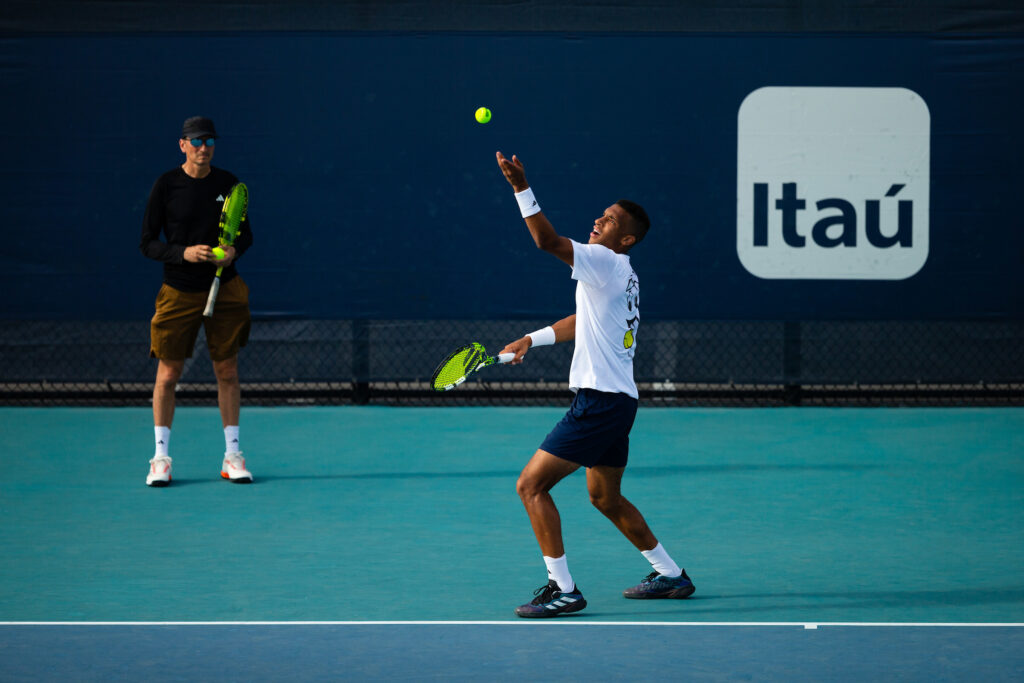The seemingly imperturbable and enduring presence in Félix Auger-Aliassime’s courtside support team is coach Fredéric Fontang.
He’s a 53-year-old Frenchman who has worked with the current world No. 9 since 2017; first as co-coach with Tennis Canada’s Guillaume Marx, then on a full-time basis since 2020.
Fontang was born in 1970 in Casablanca, where his parents were working, before returning to the family home in Pau, southwest France, when he was five.
His father played tennis and introduced him to the game. His first lesson was in Pau with Jean-Louis Rancezot, a man who would eventually be his coach when he went out on the pro tour. By the time he was 10 he was the best in his age class in France. And that despite some of his first coaches believing he was too skinny to develop into a player of any consequence.
He spent stages at French Tennis Federation centres in Poitiers and Paris before setting out on his own at age 16, playing what in those days were known as ‘satellite’ tournaments.
In 1989, he turned pro and peaked at world No. 59 in 1991. That year included his only ATP Tour title in Palermo, Italy, defeating world No. 9 Emilio Sanchez. But he never again reached those heights.
Looking back, he thinks there were a few reasons why – not evolving his game as well as he could have, not having tour-experienced people around him, and a stint of military service in December 1991 (right at the end of his best year) when he didn’t play at all. Then in 1992 he was at times confined to guard duty at the barracks.
His career lasted until 1999 when he started an academy in Pau. Among a few 12-year-olds he worked with was Jeremy Chardy. Their relationship evolved and eventually lasted for 11 years. It included Chardy winning the 2005 Wimbledon junior title, a 2009 ATP Tour tournament in Stuttgart and reaching No. 31 in the world.
Read also: First Quarter ATP Report Cards
The French Federation then asked him to coach Caroline Garcia, which he did for two years. It was during that time when Andy Murray famously declared that the 17-year-old would someday be No. 1 after she lost a thrilling three-setter to Maria Sharapova at Roland Garros in 2011.
His next career move came at the request of Louis Borfiga, the highly-regarded former French Federation coach who was in charge of high performance development at Tennis Canada in Montreal. It led to a four-year coaching association with a 21-year-old Vasek Pospisil that resulted in the British Columbia-native rising to a No. 25 ranking in singles and No. 4 in doubles.

These days, looking back to 1999 when he transitioned from player to coach and started his academy (Académie Pau Pyrénées) in Pau, Fontang said, “my personality was to want to pass on my experience. I like tennis, like development – the strategic part, the mind, the body. I was always passionate about that and studied a lot when I was a player. So it was sort of natural to start my academy at the end of my career.”
About his influences as a coach, Fontang cited Dominique Poey at the French Federation but particularly a man named Jacques Hervet.
Read also: Fontang Breaks Down Auger-Aliassime's Hot Start to 2022
“I had him as a consultant when I coached Jeremy Chardy and he had worked with (Moroccans) Younes El Ayanoui and Hicham Arazi as well as Byron Black (from Zimbabwe),” Fontang said about Hervet. “With different personalities from different backgrounds he got them all to Top 30 in the world. He was really interested in the mental approach to tennis.
“At the academy, I learned to teach, to train and to change things technically. After going through Jeremy Chardy’s development – the whole process from 12 years old to No. 31 in the world – that gave me the experience, and with Caroline Garcia and Vasek Pospisil, to help a player improve technically. And obviously now with Félix it involves all those tools – technical, tactical, communication with the player, top-level experience. I’ve created a methodology and, with Toni Nadal, who brings his experience, I try to absorb good things from people. With all that I think I’m able to use the proper approach at the right time.”

About the transition to Auger-Aliassme, Fontang said, “Vasek and I, whether it was his side or mine, after four years together kind of decided we had done everything. Louis [Borfiga] and Guillaume [Marx] spoke to me about this young boy [Félix] and Ben Sigouin who was a talented junior, for me to come and back up Guillaume and [physio] Nicolas [Perrotte] with those young guys. Ben went on to university [North Carolina] and we continued with Félix. Then evolution had it that in 2020 Félix wanted to have one coach who did the job year-round, and an outside coach who had the experience of winning a Grand Slam.”
Read also: Rafa and Felix training in Majorca
On the subject of his profession, Fontang, who still lives in Pau with his wife Valerie and daughter Heloise (17) and son Maxence (20), was asked about coaches – and in particular about the frequent tendency to anoint as the best coaches those who work with the top players.
“I don’t really like the term ‘super coach,’” he said. “The coach is obviously on the team and has done good things but you to have the basic goods [a player] to win a Grand Slam. It doesn’t happen by itself. I think the way to judge a coach is to see if his [or her] player is improving.”
Asked if he could think of any examples, Fontang said, “a coach has to be someone who gets really involved. A coach who whenever they work with a player he (or she) improves – not necessarily that they are all going to win a Grand Slam. I think what’s impressive is the work Gilles Cervara has done with Daniil Medvedev. He wasn’t a player destined to be No. 1 and to win a Grand Slam. Not many people would have bet on him. Félix played him in 2018 when he was outside the Top 50. Gilles has done good work with the basics he has.
Read also: The Evolution and Importance of the Tennis Villain
“There’s another coach who’s also good and his players always get better – [American] Dean Goldfine. (He has worked with Todd Martin, Mary Joe Fernandez, Andy Roddick, Sebastian Korda and now Ben Shelton.) They’re the kind of coaches where you see an impact and a positive progression.”
Summing up, Fontang spoke about his own coaching. “If I was to describe myself, it would be as someone who listens. That’s important because you have to start from the player. The coach in tennis is really backstage. It’s not like team sports where the coach is on the field. They’re really actors. In tennis, the coach is not an actor, he’s behind the player with the other members of the team. You have to have your ego under control and listen.”






